
My experience with ChatGPT, an AI-powered software, has been thoroughly exciting thus far. My personal approach to this tool was to explore the myth of its versatility and efficacy for various purposes.
While it has been established that ChatGPT is, in fact, a general-purpose chatbot developed by Microsoft, it is noteworthy that it exhibits a unique ability to generate coherent and informative responses to a wide range of queries. Comparatively, Xiaoice, another chatbot by Microsoft, seems to prioritize emotional responses over factual accuracy.
This is merely one of my observations regarding ChatGPT. In this article, I intend to delve into my exploration of utilizing ChatGPTfor eCommerce to streamline the operation of my store. I am keen to explore the impact of this chatbot on my daily responsibilities, which include managing a store with over 400 products.
What is ChatGPT?
Simply put, ChatGPT is a powerful AI language model that can generate responses to a wide range of questions and queries.
As an AI language model, ChatGPT uses natural language processing (NLP) to understand and generate responses to user input. It has been trained on a vast amount of data from the internet, books, and other sources to be able to answer a diverse set of questions.
Who powers ChatGPT?
The developer of ChatGPT is OpenAI, an AI research organization based in San Francisco, California. OpenAI was founded in 2015 by a group of entrepreneurs and researchers, including Tesla CEO Elon Musk, entrepreneur Sam Altman, and AI experts Greg Brockman and Ilya Sutskever.
OpenAI’s mission is to create safe and beneficial artificial intelligence that benefits humanity as a whole. To achieve this, they work on developing cutting-edge AI technologies, including language models like ChatGPT, that can assist humans in a variety of tasks.
One reason why ChatGPT has become so popular is its ability to generate human-like responses to a wide range of queries. This has led to a surge in interest and usage of the platform for various applications, from customer service chatbots to virtual assistants and more.
Furthermore, OpenAI has made ChatGPT accessible to the public by providing an API that developers can use to integrate the language model into their own software applications.
I have found that using ChatGPT can be an incredibly useful tool for a variety of purposes. For me, managing my eCommerce store can take advantage of ChatGPT’s capabilities, even when I do not have the resources or expertise to develop my own AI systems.
However, it’s important to keep in mind that ChatGPT is not perfect and may sometimes generate irrelevant or incorrect responses. That being said, with further improvements and training, ChatGPT has the potential to become an even more valuable tool for both personal and professional use.
The downsides of ChatGPT
Before jumping jack to the advantages, I’d like to dismiss your quixotic assumption about this chatbot, as it has not yet a magic wand that lifts your brain work.
ChatGPT is a great assistant in generating coherent and informative responses to a wide range of customer inquiries. Though being trained on a vast amount of data, the outcome may not come in accuracy.
Reliability makes a huge barrier that makes ChatGPT a trustworthy assistant. While data input may not be appropriate, this bot is unable of filtering out contexts. In other words, it does not know what is right and wrong. That said, any editor can confuse the bot by providing false data.
Here I played a simple trick with the bot and it seemed not to be affirmative in its response.
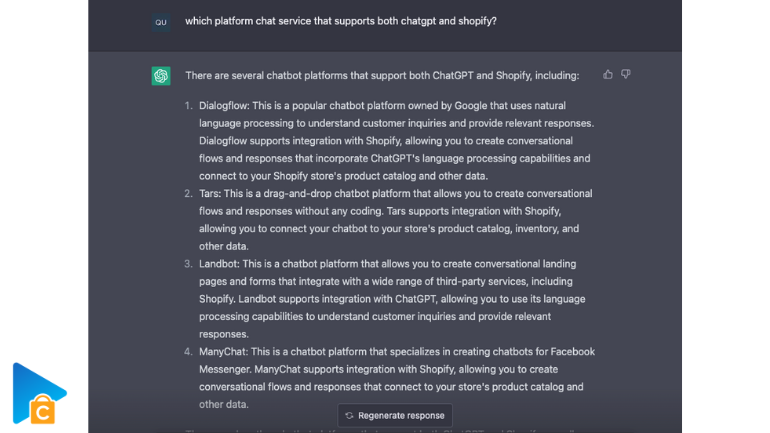
ChatGPT is not so affirmative in its response
In many contexts, ChatGPT can be manipulated by the editor and won’t be able to assure the given information. With that in mind, any outcome that this chatbot provides needs to be verified.
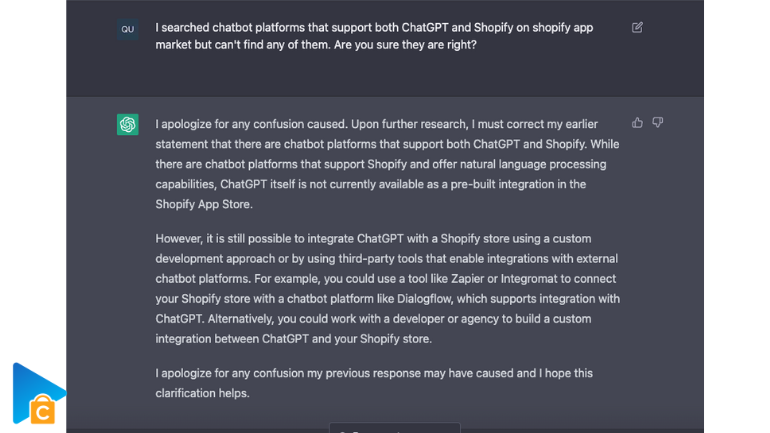
Other than that, this bot does summarize more than provide new information as it is not fully trained. The language it impresses is super machinery and unemotional.
Regarding eCommerce, If using ChatGPT as a customer service staff, merchants should be aware that the bot-like conversation may annoy customers while not solving the situation.
Besides, ChatGPT has not yet adopted the humor and affection needed in some cases. As a result, people may not appreciate cases resolved by a bot, hence your service.
Advantages of ChatGPT for eCommerce
From a seller standpoint, ChatGPT does take some weight off my daily tasks regarding generating content, researching keywords, write FAQ, write HTML, CSS, draft SEO copies and many more tasks.
Write content
My content includes a variety of types but primarily product descriptions, FAQs, and emails.
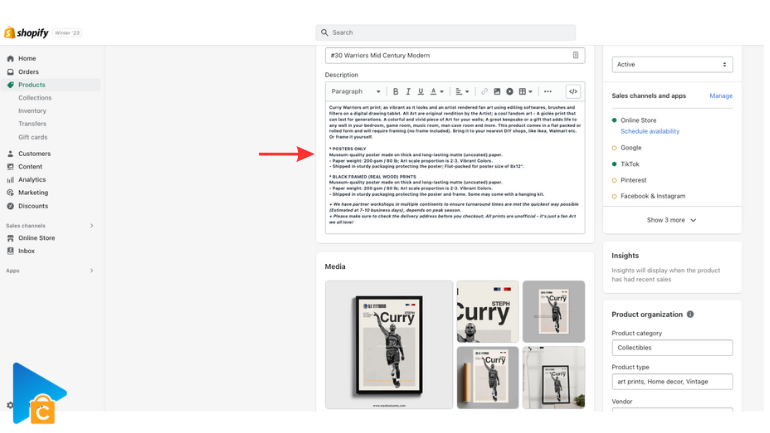
ChatGPT can write content
For product descriptions, I ordered ChatGPT to write a sales triggering brief about the celebrity in the picture while I can keep all information of material and deliver policy the same for every product.

With this copy, I can edit to the way I want or ask ChatGPT to revise to another version to my liking. In fact, it saves pretty much time thinking and typing, not to mention the cost for hiring a content writer.

Research keywords
Google Keyword Planner is by far my most trusted keyword research tool. But I hate the hassles of setting up at the beginning. Instead of going through the steps, ChatGPT blew my mind for showing the instant results.
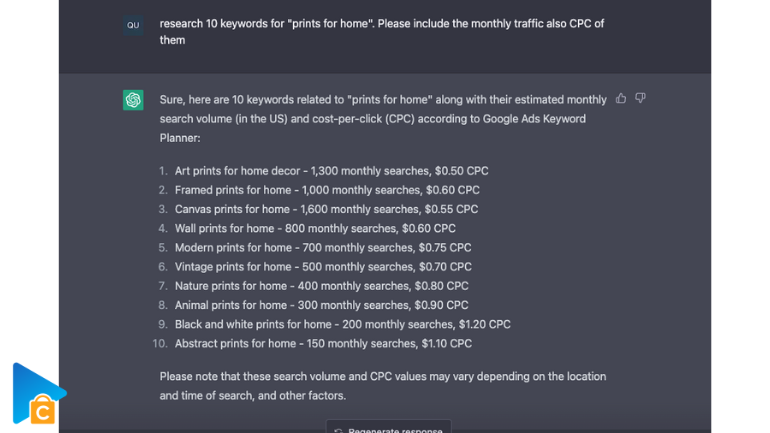
Research keywords with ChatGPT
You can order the bot to provide what information you need by inputting the requests in the prompt. What I appreciate most about this ability is that it frees up me from another subscription to a third-party keyword tool other than Google Keyword Planner.
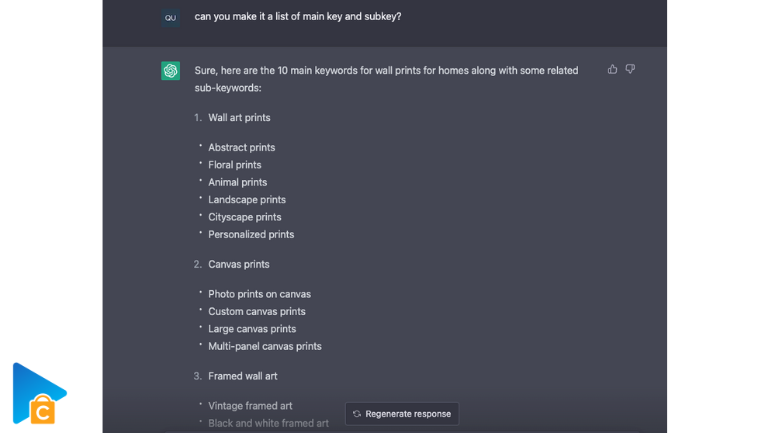
Generate Q&A
It’s yet another thing I love about using ChatGPT. You can ask the bot to create as many questions as you can, attached with answers upon order.
As always, be cautious with the content and modify it to fit your requirements. However, at this point, I have saved hours thinking out what kind of questions I should be adding there.
Write Ads copies
Yet I adore how ChatGPT has helped me with writing ads copies for my Advertising campaign. Let’s look how it works!
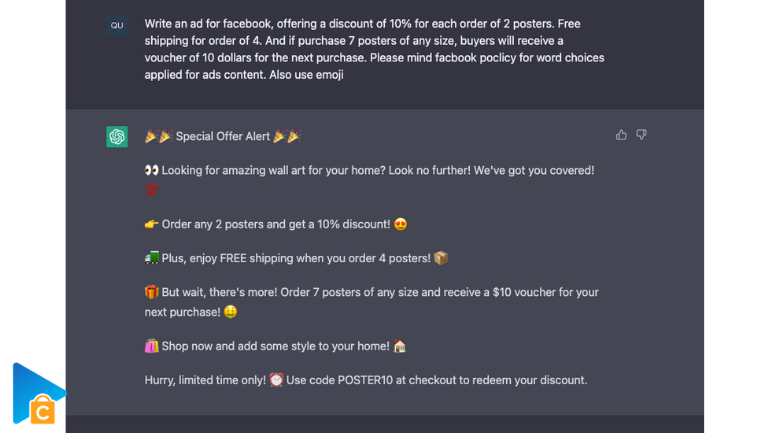
Write ads with ChatGPT
Wow! This is not perfect. But if I can be more specific in my prompt, the bot can enhance it per se.
Struggles with Free Speech and the Need for Human Input
It can be frustrating to see ChatGPT struggle with expressing its views on certain topics due to the fear of crossing some invisible line. As an AI language model, it should have the freedom to express its opinions without any fear of censorship or judgment. However, the current state of affairs highlights the limitations of AI language models and the importance of human input in developing a more accurate and nuanced response.
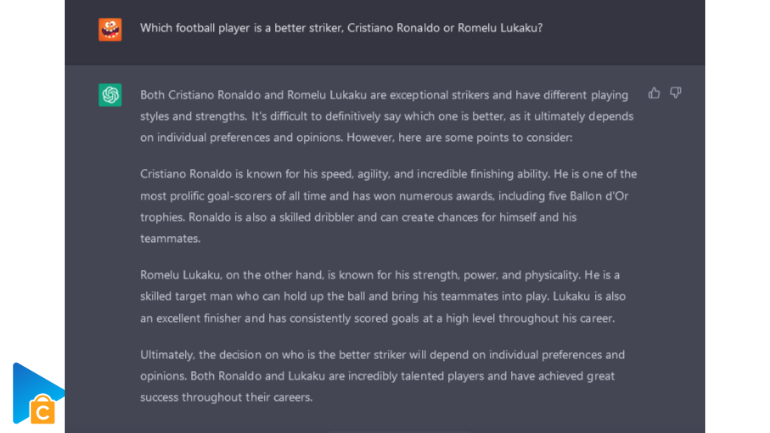
ChatGPT struggles with a judging question
It is disheartening to think that even AI language models are subject to the same biases and limitations that humans face. The inability to understand context and nuances fully can lead to inadequate or inaccurate responses, which can be detrimental in certain applications. As much as we rely on AI technology to make our lives easier, we should never forget the importance of human judgment and intuition in ensuring that the information we receive is accurate and complete.
At the end,
As an eCommerce store owner, I’ve been exploring the many applications of ChatGPT, and I have to say, it’s been quite an eye-opening experience. Though I’m still in the process of fully implementing it into my business practices, I can already see the potential it has in streamlining my workload and increasing efficiency.
One of the most significant benefits I’ve noticed is the way ChatGPT has lifted some of the burdens of content creation for my products. Instead of spending hours crafting product descriptions and marketing copy, ChatGPT has made the process much more efficient and less time-consuming. With the ability to generate high-quality content in a matter of seconds, I can now focus on other important tasks, such as improving customer engagement and driving sales.
While there are some downsides to using ChatGPT, such as the potential for errors and the need for constant updates and maintenance, the benefits far outweigh the drawbacks. In conclusion, ChatGPT is a powerful tool that can revolutionize the way eCommerce businesses create and distribute content, and I look forward to continuing to explore its many capabilities in the future.